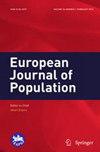一体化的故事?奥地利的移民贫富差距
IF 1.9
2区 社会学
Q2 DEMOGRAPHY
European Journal of Population-Revue Europeenne De Demographie
Pub Date : 2022-02-14
DOI:10.1007/s10680-021-09604-1
引用次数: 1
摘要
本文章由计算机程序翻译,如有差异,请以英文原文为准。
A Tale of Integration? The Migrant Wealth Gap in Austria
求助全文
通过发布文献求助,成功后即可免费获取论文全文。
去求助
来源期刊
CiteScore
4.20
自引率
8.00%
发文量
44
期刊介绍:
European Journal of Population addresses a broad public of researchers, policy makers and others concerned with population processes and their consequences. Its aim is to improve understanding of population phenomena by giving priority to work that contributes to the development of theory and method, and that spans the boundaries between demography and such disciplines as sociology, anthropology, economics, geography, history, political science, epidemiology and other sciences contributing to public health. The Journal is open to authors from all over the world, and its articles cover European and non-European countries (specifically including developing countries) alike.

 求助内容:
求助内容: 应助结果提醒方式:
应助结果提醒方式:


